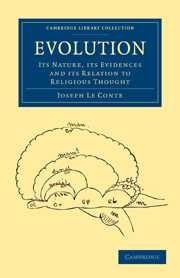Book contents
- Frontmatter
- PREFACE TO THE SECOND EDITION
- PREFACE TO THE FIRST EDITION
- Contents
- PART I WHAT IS EVOLUTION?
- CHAPTER I ITS SCOPE AND DEFINITION
- CHAPTER II THE RELATION OF LOUIS AGASSIZ TO THE THEORY OF EVOLUTION
- PART II EVIDENCES OF THE TRUTH OF EVOLUTION
- PART III THE RELATION OF EVOLUTION TO RELIGIOUS THOUGHT
- Index
CHAPTER I - ITS SCOPE AND DEFINITION
Published online by Cambridge University Press: 29 August 2010
- Frontmatter
- PREFACE TO THE SECOND EDITION
- PREFACE TO THE FIRST EDITION
- Contents
- PART I WHAT IS EVOLUTION?
- CHAPTER I ITS SCOPE AND DEFINITION
- CHAPTER II THE RELATION OF LOUIS AGASSIZ TO THE THEORY OF EVOLUTION
- PART II EVIDENCES OF THE TRUTH OF EVOLUTION
- PART III THE RELATION OF EVOLUTION TO RELIGIOUS THOUGHT
- Index
Summary
A. Type of Evolution.—Every one is familiar with the main facts connected with the development of an egg. We all know that it begins as a microscopic germcell, then grows into an egg, then organizes into a chick, and finally grows into a cock; and that the whole process follows some general, well-recognized law. Now, this process is evolution. It is more—it is the type of all evolution. It is that from which we get our idea of evolution, and without which there would be no such word. Whenever and wherever we find a process of change more or less resembling this, and following laws similar to those determining the development of an egg, we call it evolution.
Universality of Evolution.—Evolution as a process is not confined to one thing, the egg, nor as a doctrine is it confined to one department of science—biology. The process pervades the whole universe, and the doctrine concerns alike every department of science—yea, every department of human thought. It is literally one half of all science. Therefore, its truth or falseness, its acceptance or rejection, is no trifling matter, affecting only one small corner of the thought-realm. On the contrary, it affects profoundly the foundations of philosophy, and therefore the whole domain of thought. It determines the whole attitude of the mind toward Nature and God.
- Type
- Chapter
- Information
- EvolutionIts Nature, its Evidences and its Relation to Religious Thought, pp. 3 - 31Publisher: Cambridge University PressPrint publication year: 2009First published in: 1898



